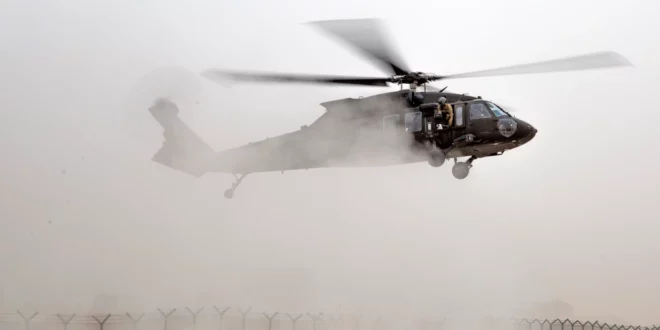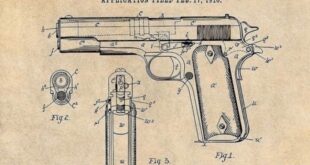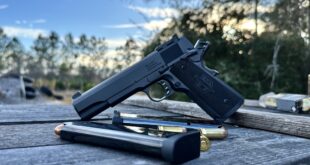by Fred A. Ganous, SGM, USA (Ret)
“I just got shot in the head!”
It was September 25th, 2006, and we weren’t in the country for over a month, and one of our own, Sergeant Don Morgan, got hit.
It was just another day in Iraq, hot and hazy, and your mouth was full of sand and dust. Bravo
Company of the Kentucky National Guard was part of the 101st Airborne Division. Aircraft 880
had just finished another long day of ring routes throughout Iraq. The pilots had made contact
with approach back into Camp Anaconda. This is one of the largest air bases still in existence in
Iraq. The base was located about 50 miles north of Baghdad. This was a daily trip for those
stationed here.
READ MORE from Fred Ganous about his time in Iraq.
Catfish Air was just notified of the soon-to-be arrival of aircraft 880. The Blackhawk helicopter
was flying low as always to avoid any bad guys until the lights went out. Left crew chief and
door gunner, Sergeant Don Morgan, had just been shot in the head and knocked unconscious.
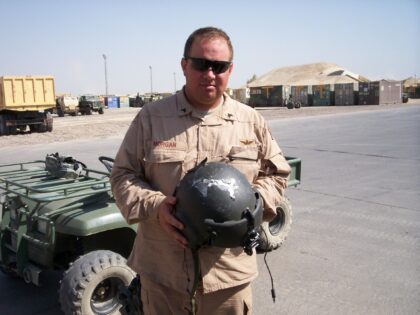
Don Morgan and his helmet.
Don had volunteered to fly this mission with our Kentucky brethren due to a shortage of crew chiefs.
The days were long, and having enough soldiers to cover down on every mission was becoming
more complex. Today’s crew was a mixture of units pieced together to make the mission happen.
And Don was shot.
The crew chief from the helicopter’s right side unbuckled, and crawled to check on his crew member.
The crew chief ran his hand into the back of his flight helmet to see if there was any blood. No blood was found, but something else was.
“Holy Shit!” the crew chief said.
Sergeant Morgan replied: “Man, you don’t say that to a guy that just got shot!”
“There is a gash the size of the grand canyon through your helmet!”
The crew immediately radioed Catfish Air to inform them they had a crew member just shot in the head.
The crew diverted from the regular parking area and landed on a maintenance pad near the TOC.
On the move were medical vehicles heading in the helicopter’s direction.
Doc McArthur led the personnel on call for any 911 action that came to the Mustang Clinic. Doc was a captain at the time and was the flight physician’s assistant for our group. He was well-received by all of the enlisted personnel, and loved his job. He was always approachable and was there for everyone in
need of assistance. The crew chiefs loved Doc because he was not your typical officer. Doc treated
everyone the same, regardless of rank. This is why he carried a tremendous amount of
respect from all.
Doc quickly assessed our crew member, and had him transported to the Mustang Clinic. At the
clinic, he did everything except give the patient the finger. No, not the middle finger; the
other one males typically get. Don had just dodged death by inches. The round penetrated the rear
crown of the helmet, and exited out the very top. Don had no blood loss other than the round, which gave him a good bruise and parted his hair, literally.
The impact caused enough to knock him out, so a further diagnosis was that he had incurred a
concussion.
Doc administratively grounded Sergeant Morgan to ensure no after-effects and that his gourd
remained intact to continue his flight duties. After some grounded relaxation within Camp
Anaconda, Don could continue flying again. He did continue his flight duties, but with the finger on the trigger from this point forward.
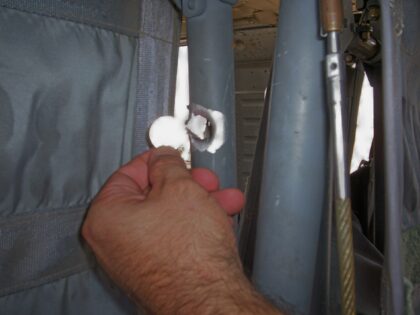
The bullet left a gash the size of a quarter.
The Marine Corps ballistics team gauged the first entry area, which was a passenger seat frame. After completing their assessment, the team determined that the bullet would be equivalent to the .50 caliber round that U.S. forces use. The round penetrated the helicopter’s right side, drove through a seat frame,
and struck Sergeant Morgan in the helmet. The round exited his helmet, and continued through
the top window frame on the aircraft’s left side, narrowly missing the crew chief on the right-
hand side of the Blackhawk helicopter.
After a full year on the ground in Iraq, flying missions daily, Sergeant Morgan returned stateside.
His battalion submitted the required paperwork for him to receive a Purple Heart.
Somehow, those who sit in big offices decided that the incident did not warrant this medal, and denied the request. Approximately another year later the unit again tried to submit the required paperwork, and again, that person in the big office denied this request.
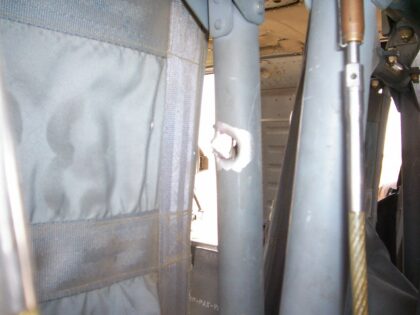
The bullet’s path.
For many years leadership put forth the effort in pushing for this award. However, the idea dissipated after a while, and Don was just left with a horrible memory of the incident.
After serving another eight years, Staff Sergeant Morgan was medically discharged due to those combat injuries. He had fought the pain long enough, and the Army felt it was time to hang up his boots.
I would say that Sergeant Morgan did have an angel on his shoulder that day. The good Lord above felt it wasn’t his time yet.
Fred Ganous is a combat veteran of the Iraq war, and has spent his career in aviation.
 Soldier of Fortune Magazine The Journal of Professional Adventurers
Soldier of Fortune Magazine The Journal of Professional Adventurers


